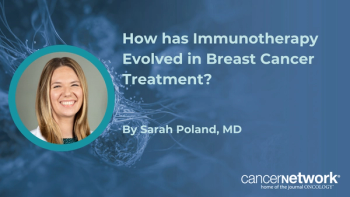
Advantage of Multigene Test for Women at Risk of Hereditary Breast Cancer
A new study is suggesting that testing for variants in seven cancer-associated genes followed by risk-reduction management could cost-effectively improve life expectancy for women at risk for hereditary breast cancer.
A new study is suggesting that testing for variants in seven cancer-associated genes followed by risk-reduction management could cost-effectively improve life expectancy for women at risk for hereditary breast cancer. The current standard is to just test for two genes: BRCA1 and BRCA2 (BRCA1/2).
In an article
The authors estimated effectiveness and lifetime costs from a payer perspective for two strategies in two hypothetical cohorts of women (40-year-old and 50-year-old cohorts). All of these women met the family history criteria for multigene testing, according to the National Comprehensive Cancer Network. The researchers compared the usual BRCA1/2 test strategy to a next-generation seven-gene strategy, which tests for variants in BRCA1/2, TP53, PTEN, CDH1, STK11, and PALB2. The authors then used these test results to select appropriate breast cancer risk-reduction therapies.
Incremental cost-effectiveness ratio (ICER) for the seven-gene test strategy compared with the BRCA1/2 test strategy was $42,067 (50-year-old cohort) and $23,734 (40-year-old cohort), respectively, per life-year gained. The authors write that at these ICER levels, the seven-gene test strategy would be considered cost-effective according to the guidelines by the World Health Organization. The team also conducted a probabilistic sensitivity analysis. It showed the seven-gene test strategy cost less than $100,000 per life-year gained in 95.7% of the trials for the 50-year-old cohort.
“Pathogenic variants in the BRCA1 and BRCA2 genes explain only about 15% of the breast cancer familial relative risk,”
Li et al report that their deterministic sensitivity analysis demonstrated that the more frequently other pathogenic variants are detected besides BRCA 1/2, the more cost-effective a multigene panel testing becomes. Identiï¬cation of these pathogenic variants from testing an expanded panel of genes could lead to clinical action. The authors theorize this could increase life expectancy.
The researchers note a limitation in this current analysis is that the risk for breast cancer is well-studied in carriers of BRCA1/2. However, the risk of breast cancer is less well-established for carriers of pathogenic variants in the five genes in the panel that are not BRCA1/2 (TP53, PTEN, CDH1, STK11, and PALB2).
“The results of this study demonstrate the potential value of newer testing options that allow for the simultaneous analysis of expanded panels of additional genes whose pathogenic variants confer moderate to high risk for breast cancer,” said Li.
Newsletter
Stay up to date on recent advances in the multidisciplinary approach to cancer.














































